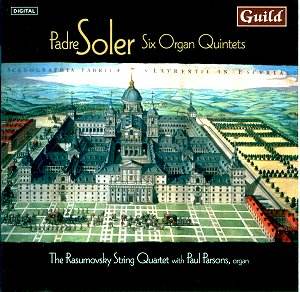Padre Antonio Soler
is best known for his astonishing Fandango
for harpsichord and for the Six Concertos
for two organs, of which several recordings
have been made. The pieces featured
on this recording are the only music
I know of scored for string quartet
and organ. They were discovered by the
late American organist, Donald Joyce.
They were possibly written for the son
of the Spanish King Ferdinand VI, who
was a student of Soler and for whom
the concertos for two organs had certainly
been composed.
Soler's style is a
unique interpretation of the Galant
world of composition, encompassing earlier
models and Spanish folk song-related
ideas. The forms of the quintets are
very irregular; between three and six
movements, with many of the movements
subdivided into further small sections.
The 6th quintet as an example consists
of three movements, the first of which
is divided into five smaller sections,
but the finale of which is an unbroken
21 minute rondo with variations. The
organ features in a variety of ways,
seldom as a solo instrument in the sense
of a concerto, nor as a continuo instrument,
but as an equal member of the ensemble.
The quality of the music is predictably
variable but the concept is refreshingly
different. This is the first recording.
The organ chosen is
a beautiful sounding Goetze and Gwynn
copy of a chamber organ by Thomas Parker
dating from the mid 18th century. It
may seem a strange choice but, as is
pointed out in the booklet, such organs
shared many similarities with Spanish
instruments of the same period, most
notably the soft, stringy principals
and brighter upper-work. The extended
bass compass is also essential. Parsons
additionally makes use of a slightly
ill-sounding regal when called for by
Soler.
Given the effort to
have playing scores created, the obvious
enthusiasm by the performers to have
the music recorded, and the planning
and thought that has gone into the whole
project, it is with some regret that
I cannot recommend this recording. The
main problem is one of tuning. Organ
builder Martin Goetze informs me that
he thinks the 'Parker' organ was tuned
in Barnes 'Bach' temperament for the
recording, and the contrast between
the many pure thirds in the organ and
the much wider thirds played by the
quartet creates an uncomfortable incongruity
from the outset. In addition, the Rasumovsky
Quartet play on gut strings and with
Classical bows, but don't convince me
that they have enough experience in
this area; intonation and tone quality
are constantly compromised. It is possible
to make beautiful sounds on gut strings
too! The biographical note on the quartet
acknowledges that playing such music
in this manner is only one of their
large variety of activities and the
lack of specialisation is regrettably
evident. While the recording quality
is very fine, I would have preferred
a slightly larger acoustic (the organ
is mobile and was on loan from Leeds
University for the recording) to give
the sound more bloom, as would have
been the case at the Royal Monastery
at El Escorial where these pieces may
have been originally performed. On the
positive side, all the performances
seem well paced, and Paul Parsons plays
well throughout, especially as I understand
he had to cope with pipes being re-tuned
to play notes outwith the treble compass
(top d# re-tuned to g and top c# to
f, the 'Parker' organ going only to
e) and having to add stop changes during
pieces in order to play certain passages
an octave lower.
A nice idea then, but
not a wholly satisfactory result.
Gwyn Parry-Jones


